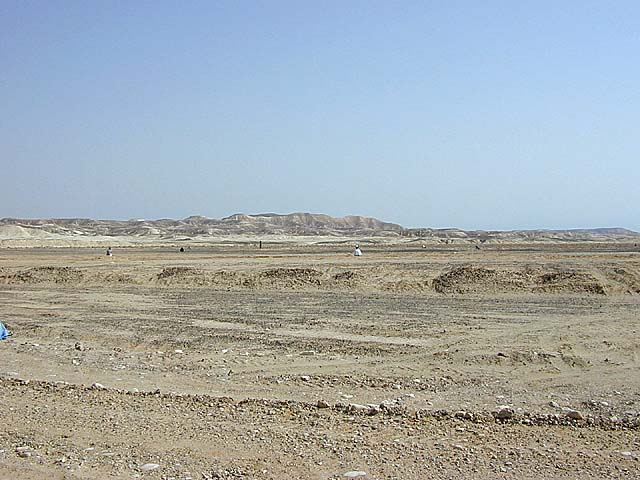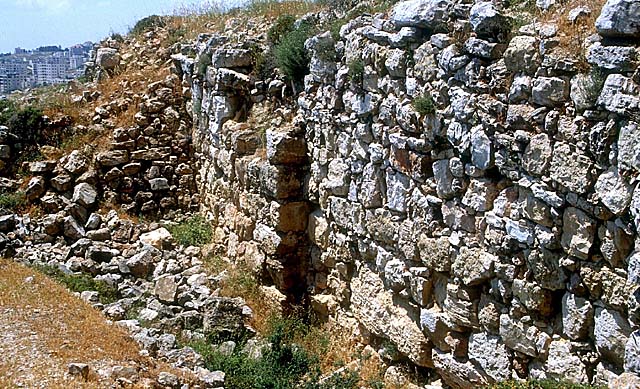Who is…
Ishmael
Hebrew: יִשְׁמָעֵאל —transliteration: Yishmael or Yishma'e'l or Ishmael -meaning: God hears; God will hear (similar to the name “Ishmaiah”)
This is the name of 6 biblical men. The name Ishmael appears 47 times in the Bible (Old Testament).
-
Ishmael, Abraham’s (Abram) eldest son, by Hagar his concubine
Ishmael’s descendants are called Ishmaelites.
He was born at Mamre, when Abraham was 86 years of age, 11 years after Abram’s arrival in Canaan (Gen. 16:3; 21:5).
 View the biblical story—a moving segment of The HOPE video online
View the biblical story—a moving segment of The HOPE video onlineNow Sarai [Sarah], Abram’s wife had borne him no children, and she had an Egyptian maid whose name was Hagar. So Sarai said to Abram, “Now behold, the Lord has prevented me from bearing children. Please go in to my maid; perhaps I will obtain children through her.”
And Abram listened to the voice of Sarai. After Abram had lived ten years in the land of Canaan, Abram’s wife Sarai took Hagar the Egyptian, her maid, and gave her to her husband Abram as his wife. He went in to Hagar, and she conceived…
The angel of the Lord said to her [Hagar] further,
“Behold, you are with child,
And you will bear a son;
And you shall call his name Ishmael,
Because the Lord has given heed to your affliction.
He will be a wild donkey of a man,
His hand will be against everyone,
And everyone’s hand will be against him;
And he will live to the east of all his brothers.” —Genesis 16 NASB excerptIshamel was circumcised at the age of 13 (Genesis 17:23-25).
He grew up a true child of the desert, wild and wayward. On the occasion of the weaning of Isaac his rude and wayward spirit broke out in expressions of insult and mockery (Gen. 21:9-10); and Sarah, discovering this, said to Abraham, “Expel this slave and her son.”
Influenced by a divine admonition, Abraham dismissed Hagar and her son with no more than a skin of water and some bread. The narrative describing this act is one of the most beautiful and touching incidents of patriarchal life (Genesis 21:14-16). (See HAGAR.)
The modern day wilderness of Paran where Ishmael initially settled after leaving Abraham (click for enlarged image).Ishmael initially settled in the land of Paran, a region between Canaan and the mountains of Sinai; and “God was with him, and he became a great archer” (Genesis 21:9-21).
He became a great desert chief, but of his history little is recorded.
Ishmael was about 90 years of old when his father Abraham died. On this occasion the two brothers Ishmael and Isaac again met after being long separated. Together they buried their father Abraham in the cave of Machpelah (Genesis 25:9).
Isaac with his hundreds of household slaves, Ishmael with his troops of wild retainers and half-savage allies, in all the state of a Bedouin prince, gathered before the cave of Machpelah, in the midst of the men of Heth, to pay the last duties to the ‘father of the faithful,’ would make a notable subject for an artist.
Of the after events of his life, little is known. He had 12 sons, who became the founders of so many Arab tribes or colonies, the Ishmaelites, who spread over the wide desert spaces of Northern Arabia from the Red Sea to the Euphrates (Genesis 37:25; 37:27-28; 39:1), “their hand against every man, and every man's hand against them.”
In the New Testament, Isaac, as the child of promise, is contrasted with Ishmael (Galatians 4:28; Romans 9:7; 9:10; Hebrews 11:18).
Muslims are taught that Abraham attempted to sacrifice Ishmael on an altar, not Isaac. They are also taught that Ishmael, not Isaac, received the promise from God through Abraham.
Ishmael died at the age of 137 years (Gen. 25:17), but where and when are unknown. He and his people,
…settled from Havilah to Shur which is east of Egypt as one goes toward Assyria; he settled in defiance of all his relatives. —Genesis 25:18 NASB
Ishmael in Pre-Islamic Arabia
Some Pre-Islamic poetry mentions Ishmael, his father Abraham, and the sacrifice story. One example is the Pre-Islamic poet Umayyah Ibn Abi As-Salt. Zayd ibn Amr is another Pre-Islamic figure who refused idolatry and preached monotheism, claiming it was the original belief of the Arabs’ father Ishmael.
Some of tribes of Central West Arabia call themselves the “people of Abraham and the offspring of Ishmael.”
Relatives of Ishmael, son of Abraham
- Father: Abraham
- Mother: Hagar
- Known Brothers: Isaac, Midian
- Wives: According to the Bible, Hagar married Ishmael to an Egyptian woman (Genesis 21:21). Her name is not known, nor is the number of other wives he may have had.
- Known Sons:
- Known Daughters: Only is one mentioned in the Bible—Mahalath or Bashemath (Basemath) who became the 3rd wife of Esau
Origin of the Arabs
The ancient Jewish historian Flavius Josephus described the descendants of Ishmael as Arabs, linking them with the historical Nabataeans of Hellenistic and Roman times:
“twelve sons in all were born to Ishmael, Nabaioth(es), Kedar, Abdeêl, Massam, Masma, Idum(as), Masmes, Chodam, Thaiman, Jetur, Naphais, Kadmas. These occupied the whole country extending from the Euphrates to the Red Sea and called it Nabatene. And it is these who conferred their names on the Arabian nation (to tōn Arabōn ethnos) and its tribes.” —Antiquities of the Jews 1.12.4
The identification of the Arabs as Ishmaelites was also expressed by early Christian scholar Origen of Alexandria and by the Greek scholar Apollonius Molon. This was also expressed by early Christian scholars Jerome and Eusebius.
Q & A- Who is Abram?
 Who is Abraham? and what is his significance?
Who is Abraham? and what is his significance?- Who is Hagar?
- What is Paran?
- What is an Ishmaelite, and what is their Biblical significance?
- What is Kedar, and who are the Kedarites (Kedareans)?
- What is are Arabs in the Bible, and what is their origin and significance?
- Answers about Arabia in the Bible
More information
- View the biblical story—segment of The HOPE video online
- About Islam—an overview for Christians
- Witnessing to Muslims
-
Ishmael, a treacherous royal son of Nethaniah
Ruins of Mizpah, the place where Ishmael, son of Nethaniah, killed GedaliahPhoto © BiblePlaces—a ChristianAnswers Contributing Specialist.He is a grandson of Elishama (Jeremiah 40:8; 40:15).
He was an ally of the Ammonite King Baalis, his co-conspirator (Jeremiah 40:14). With a hit team of ten men, he assassinated the foreign-installed governor of Judah, Gedaliah (son of Ahikam) at a dinner party. This occured at the time of King Nebuchadnezzar (see account: 2 Kings 25:22-26; Jeremiah 40:7-41:16).
He also killed “the Jews and the Chaldees that were with him [Gedaliah] at Mizpah” (2 Kings 25:25). He carried off many captives, “and departed to go over to the Ammonites” (Jeremiah 41:10).
When Johanan and the army officers with him heard about Ishmael’s crimes, they went to stop him and caught up with him at the pool in Gibeon. Ismael escaped among the Ammonites (Jeremiah 41:11-12), and the captives were rescued.
-
Ishmael, a son of Azel
He is a descendant of Prince Jonathan the son of King Saul (first king of Israel) (1 Chronicles 8:38).
Azel’s known brothers are Azrikam, Bocheru, Sheariah, Obadiah and Hanan.
-
Ishmael, a judge and father of Zebadiah
He was appointed by the Judean King Jehoshaphat (2 Chronicles 19:11).
-
Captain Ishmael, a son of Jehohanan
2 Chronicles 23:1
He was a captain in the army who assisted the High Priest Jehoiada in defeating the evil Queen Athaliah (daughter of Ahab and Jezebel), so that Joash (the rightful heir to the throne) could be made Judah's king.
-
Ishmael, a son of Passhur (aka Pashur)
He was a Jewish priest and father.
After the Babylonian Exile, in defiance of God’s will, this Ishmael married a pagan foreign wife (Ezra 10:22).

